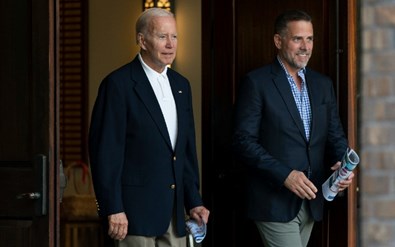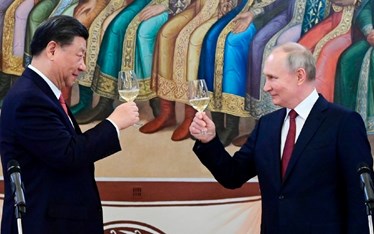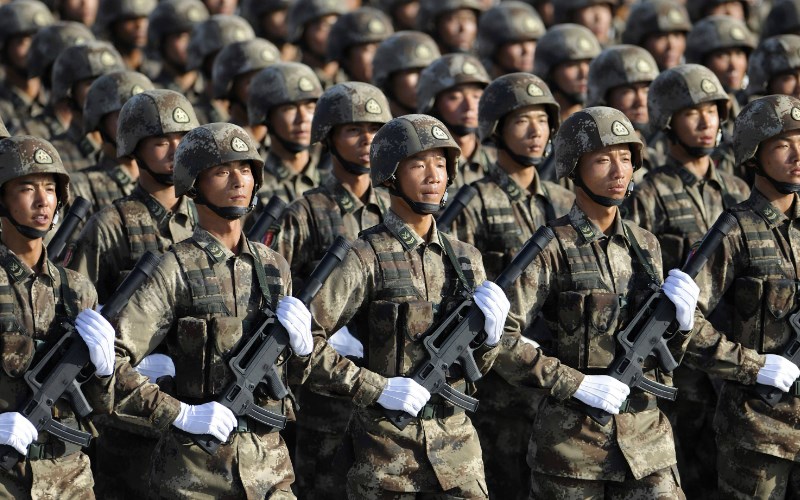It's not as obvious as battlefield deaths in a conflict with nightly coverage on television news, but Americans are dying by China-sanctioned killing, according to Gordon Chang. Chang, a leading U.S. authority on China and author of multiple books, is often seen and heard on Fox, CNN, Newsmax and many other media outlets.
"We have seen the Chinese kill Americans in great numbers," Chang said during an interview on American Family Radio on Monday.
The People's War began in 2019 as a response to tariffs instituted against Chinese imports by former president Donald Trump. State-controlled media in Beijing used strong language in its coverage then, accusing the U.S. of engineering a campaign of "greed and arrogance" while adding that China would work to protect its "legitimate rights and interests."
An editorial published in mid-May 2019 by both the Xinhua News Agency and the People's Daily, the official newspaper of the Central Committee of the CCP, said: "The trade war in the United States is the creation of one person and his administration who have swept along the entire population of that country. Whereas the entire country and all the people of China are being threatened. For us, this is a real 'People's War.'"
In one prime time newscast, CCTV anchor Kang Hui boldly stated that China would "fight for a new world. There's nothing we haven't seen before."
Simple name, serious war, substantial murders
If a "People's War" is a non-traditional moniker, its effects are still far-reaching, Chang said. "They did that [People's War] in May of 2019, and they have a doctrine of unrestricted warfare," he explained.
He cites organized crime with its abuse of fentanyl and COVID-19 as Beijing's primary acts of aggression.

"For instance, fentanyl. We think of fentanyl as coming from Chinese gangs, and we call them criminals. The point is those 'criminals,' quote-unquote, they have got the full backing of the Community Party because in China's total-surveillance state, these large organizations … cannot operate without the blessing of the party," Chang argued.
Chinese gangs, he continued, have actually laundered their proceeds to the Chinese state banking system. Indeed, the intermingling of China's criminal gangs and its government is a story line that dates back to the early 1900s and for years found its way to America's movie screens – but it's a real-life problem.
ThePrint.in, an online news service founded by Indian journalist and author Shekhar Gupta in 2017, reported in 2021 how the Chinese government works with criminal organizations, many operating outside of mainland China, to achieve certain political goals.
"When we have the numbers for last year, I think we'll learn that more than 80,000 Americans died from doses of illegal Chinese fentanyl," Chang shared. "We should consider each one of those a murder."
According to Chang, the Chinese also bear some responsibility for American deaths due to COVID-19.
"We don't know where it came from, but once it got out into the Chinese population, they actually decided to spread it to the rest of the world by lying about transmissibility and through other things," he stated. "And that means 1,121,000 Americans have died from a disease that should not have left the central part of China. We should consider them murdered as well."
 Hunter Biden connections
Hunter Biden connections
The People's War began against U.S. policy found offensive by China. But it continues amid disturbing revelations about connections to China for President Joe Biden's son, Hunter Biden, and questions about how committed Joe Biden is to standing against China.
Media coverage in the U.S. documents questionable contacts between Hunter Biden and CCP-linked enterprises as far back as 2009 – early in Joe Biden's eight-year run as vice president under Barack Obama.
"If Hunter Biden did anything compromising on Chinese soil, the Ministry of State Security is going to know about it and have video recordings – and that can be used for blackmail. They could blackmail the president of the United States, or the president could decide to just not go after China because he knows what they have," Chang said.
Complicating the situation even further, according to the China expert, is that President Biden has a view of China that is like living "four decades ago."
"Even if there's no corruption, Biden has decided the Chinese are not a threat to the United States – and that's why we could lose our country to a China that's by the metrics far less powerful than the United States," Chang said.
Some U.S. leaders said Biden's response to a suspected Chinese spy balloon earlier this year didn't look very powerful at all. Senate Minority Leader Mitch McConnell (R-Kentucky) called it a "weak reaction," noting that the balloon drifted over wide-open spaces in the Aleutian Islands, Alaska and Canada where it could have been shot down before it floated above sensitive military sites in the U.S.
China insisted the balloon was simply the result of an accident involving civilian aircraft and threatened action. But it became solid-gold material for late-night news-comedy talk shows before the U.S. took it down after it had traversed a large portion of the country.
Former U.S. President Richard Nixon has been credited for normalizing relations with China after his trip to Beijing in 1972. But Chang says subsequent administrations have erred in their policies regarding China, and that has led to strained relations today.
 Friendship without limits
Friendship without limits
Western ways in jeopardyChad Groening, American Family News
Bob Maginnis, a senior army strategist and Pentagon advisor, says the growing alliance between China and Russia is a threat to the United States. Though Putin's invasion of Ukraine has left his country largely ostracized on the world stage over the past year, Beijing has grown increasingly friendly with Moscow. Both Xi and Putin seek a new world order that favors their authoritarian agendas, replacing the pro-West democratic institutions established in the wake of World War II. Recent public statements by both men evidence this mandate. Maginnis says America needs to be concerned. "On every single front, there is progress on their side building that alliance, and the alliance also includes other nations; it's not just them," he points out. "Certainly Iran and North Korea, but other nations that they are leveraging -- China through the Belt and Road Initiative, and the Russians through energy sales and the like. Geopolitically, this is very, very threatening to the United States and the Western world's way of doing things." Maginnis adds that Putin and Xi both have every intention of readjusting the world order to their liking, "which would mean that the post-World War II, post-Cold War world order that includes capitalism and civil liberties is out the window." So he would argue that "all of our way of life … is jeopardized by the people in the White House and by the people in the Congress that don't understand what's going on." |
The wheels are still turning. As Russia's war in Ukraine continues now, its relationship with China strengthens. Just yesterday (Tuesday), Chinese President Xi Jinping and Russian President Vladimir Putin, while meeting in Moscow, signed an agreement to expand their economic ties. Based on Putin's comments, a natural gas pipeline from Siberia to China looks like a sure thing now as Xi touts a "friendship without limits" between the two countries.
"During the Cold War, I can see why President Nixon wanted to separate the Chinese from the Russians, and so the Cold War ended two against one: Beijing and Washington on one side, and Moscow on the other," recalled Chang. "But after the Cold War, I think we made a strategic error because we then saw the Chinese regime going in the wrong direction."
He explained that Americans during the Cold War were often overcome with a sense that reasonable nations would prefer a representative-democracy like the one that exists in their own country. That line of thinking was wrong, according to Chang.
"During the Cold War, we Americans felt that everyone would become just like Americans," Chang said. "Of course, that hasn't worked out – because as the Chinese regime got stronger it didn't become benign. It become more hostile, provocative and belligerent."
Editor's note: In photo above, Russian President Vladimir Putin, right, and Chinese President Xi Jinping toast during their dinner in the Moscow Kremlin, Russia, Tuesday, March 21, 2023. (Pavel Byrkin, Sputnik, Kremlin Pool Photo via AP)







